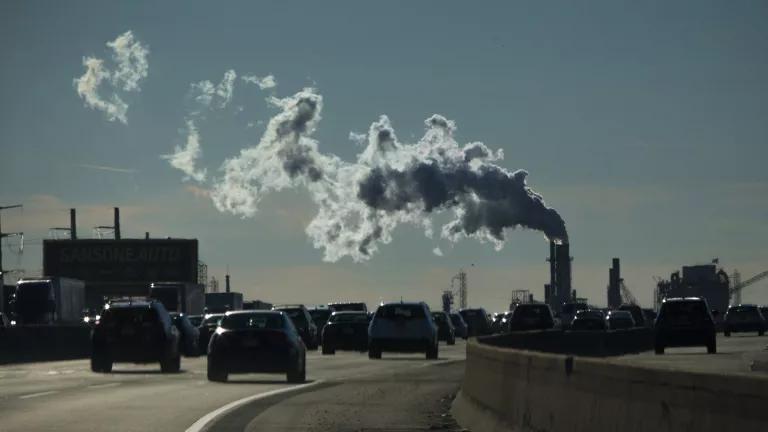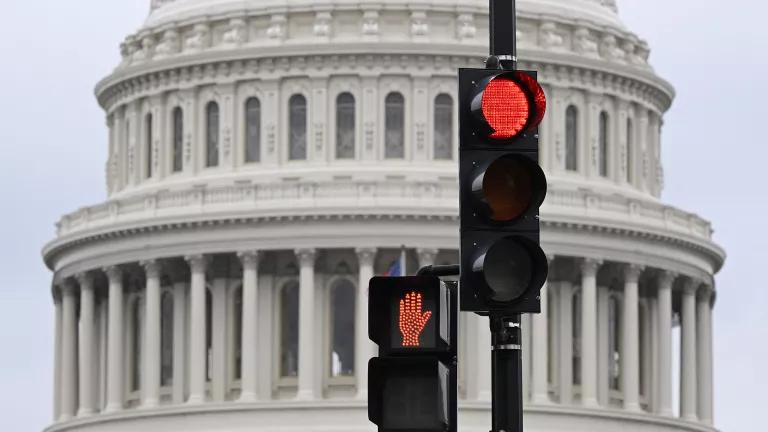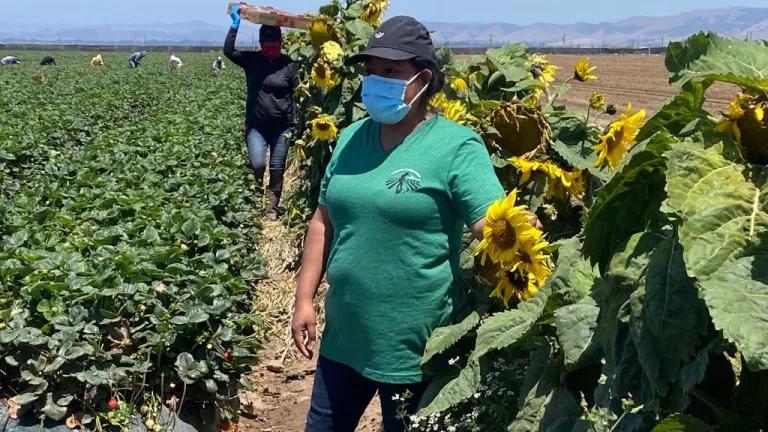Americans Desperately Need Help. The Latest Coronavirus Stimulus Package Is a Good Start.
But future packages need to make sure that polluting industries aren’t treated with more deference than average citizens.
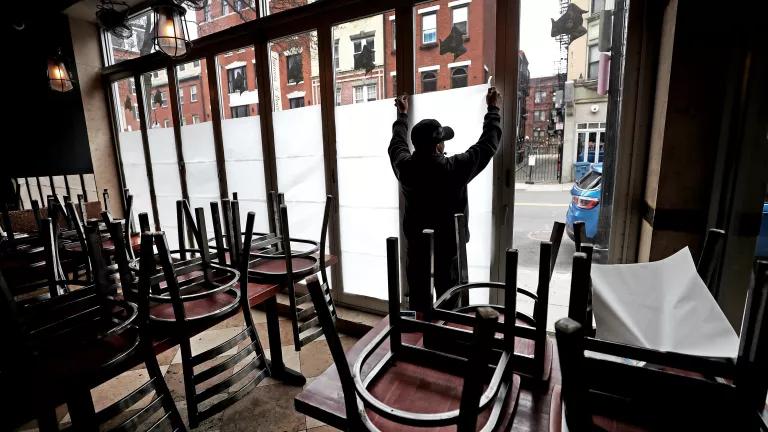
An employee of Carmelina's restaurant in Boston covers the windows to prepare for its closing during the COVID-19 crisis.
Last week, both chambers of Congress passed—and President Trump signed—an emergency coronavirus relief bill worth more than $2 trillion. The largest economic stimulus package in our nation’s history is meant to provide immediate, desperately needed aid to the hundreds of millions of Americans whose lives have been turned upside down by the pandemic.
As broad in scope as the catastrophe it seeks to address, the plan calls for an expansion of unemployment coverage, an easing of rules regarding student debt, additional loans and grants for businesses to retain workers, and one-time payments to individuals in the form of checks mailed directly to households, among other measures. Even so, it’s no panacea: It should be regarded as an early, if significant, step in what promises to be a long and difficult journey toward recovery. In the words of House Speaker Nancy Pelosi, uttered on the House floor just before her chamber’s vote on Friday, “This cannot be our final bill.”
It most certainly won’t be. This stimulus package was the third piece of COVID-19–related legislation to be passed in as many weeks. Already, lawmakers are discussing what will go into a fourth. My NRDC colleagues and I were happy to see certain aspects of the bill that suggest Congress and the president are prioritizing what must be placed first, above all else: ensuring the health and well-being of Americans by easing their immediate physical and financial burdens, and by seeing that their most basic needs are being met.
In other ways, we found the bill wanting. But we remain hopeful that our leaders in Washington will build on what’s good in the current plan—so that the next phase of the recovery does even more to protect families, workers, and communities right now, while also protecting the climate and public health long-term.
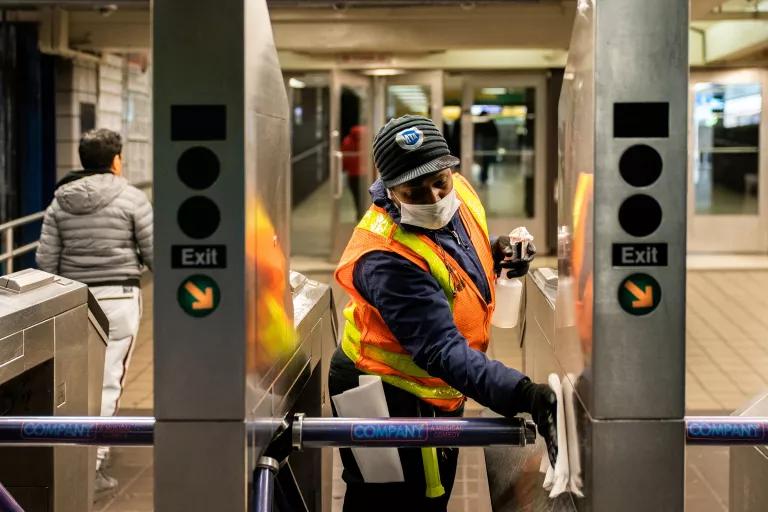
An MTA transit worker cleans a nearly empty Times Square subway station following the outbreak.
The Good
For tens of millions of low-income and working-class Americans, fear of the coronavirus is coupled with the fear of being unable to make basic ends meet.
As these individuals struggle to keep themselves and their families safe by staying inside their homes, the last thing they should have to worry about is their electricity being shut off. That’s why NRDC fought to make sure that lawmakers didn’t neglect the Low Income Home Energy Assistance Program (LIHEAP) when they were distributing emergency funds to federal programs, in order to help people make it through these first few months of the ongoing COVID-19 crisis. This initiative, which serves low-income households that require assistance in covering their monthly energy costs, will receive an extra $900 million in stimulus money. That’s good—but it’s still half a billion dollars less than what House lawmakers had originally asked for. Later bills will need to increase this funding so that the most economically vulnerable among us aren’t shattered by energy expenses when they can least afford them. Congress should also ensure that consumers have access to electricity and heat for the duration of the crisis, and that utility service isn’t shut off for nonpayment.
The stimulus package also included support for the nation’s public transit, which millions of people rely on to get to and from their homes, schools, and jobs, making it essential to our nation’s economic health. It also cuts the amount of health-harming air and climate pollution created by automobile exhaust. We advocated for extra transit funding and were happy to see that the final bill puts $25 billion into these systems to offset massive losses and to make sure that our buses, subways, light-rail networks, and passenger trains stay up and running. Their use is critical right now for medical workers and other emergency personnel, as well as people who need to obtain groceries and medicine—not to mention the heroic supermarket and pharmacy employees who help them obtain it. But it’s also important later, once Americans begin returning to their jobs in greater numbers. We were also glad to note that Amtrak is to receive $1 billion in emergency stimulus funds, which should help to keep this lower-carbon alternative to air and automobile travel functioning and ready to roll once regional travel patterns begin to pick up again.
Happily missing in the final bill was a handout to the oil industry. With global oil prices dropping to an 18-year low, Senate lawmakers had originally seen fit to include in their bill an extra $3 billion to go toward the filling of America’s Strategic Petroleum Reserve with domestically produced petroleum products. But the House version of the bill contained no such provision—and in the end, it didn’t make the cut. That’s thanks in part to advocacy by NRDC and other environmental groups who called this out for what it was: an unnecessary gift to an industry that already receives billions in subsidies from the federal government in normal times. Congress was right not to use this moment to further lock in our dependence on dirty fossil fuels and delay our transition to a clean energy economy.
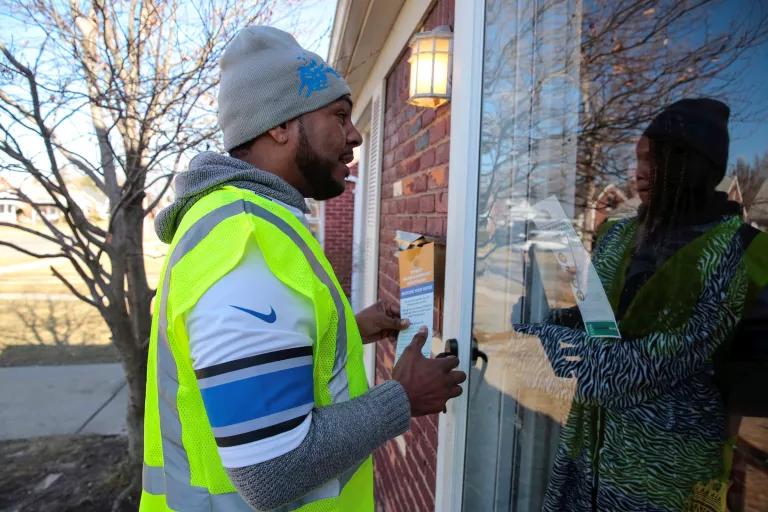
Vaughn Harrington delivers a notice by the Detroit Water and Sewerage Department informing residents how to restore water service in response to the outbreak.
The Not-So-Good
While the stimulus package includes support for covering electricity costs, it ignores the need to make sure that no household goes without water. The House version of the bill had allotted $1.5 billion to help low-income households pay their water bills and also banned utility providers from shutting down service to local customers during the crisis. Neither of these provisions, however, made it into the final version. Access to safe drinking water is a basic human right—and it’s more critical than ever when people are being asked to stay inside their homes to protect their communities. It’s also more important than ever at a time when handwashing has the ability to save lives. We need every single person in this country to have access to a working tap that dispenses clean water. Some states are recognizing this—Michigan, North Carolina, and Ohio have prohibited their water utilities from cutting off service to customers during this time. But this should not be a state-by-state issue; this concern must be addressed by Congress to ensure it’s happening nationwide.
The stimulus package also missed an important opportunity to help rebuild the economy in a way that would have been lasting and healthier. One of the easiest ways Congress could have fulfilled lawmakers’ stated obligation of protecting American workers would have been to ramp up investment in clean energy technology, which has already created more than 3 million U.S. jobs and has the potential to create tens of millions more. Sadly, neither the House nor the Senate version of the bill included assistance to the clean energy sector—representing yet another missed opportunity to link job security, public health, and climate action in a way that compounds the benefits of each. We’ll keep pushing for future stimulus packages to recognize that the road to recovery must steer us away from our dependence on fossil fuels, which threatens our health and future.

Fearless Girl and the New York Stock Exchange
The Outlook
Priority number one for our nation right now must be saving lives. We have to get supplies and personal protective equipment to the medical personnel who are risking their lives every day to save ours. We have to shore up our public health infrastructure and slow the spread of the coronavirus as quickly as possible. At the same time, the federal government must prepare us to weather the economic emergency that has become inextricable from the public health crisis we face.
The challenge is unprecedented—but we can overcome it. We’ll get through this, with strong wills and smart solutions geared toward helping people stay safe and healthy in both the short and long terms. Our nation has fought and won tough battles before by rolling up our sleeves and getting to work—together. We can do it again, and come out of it stronger than ever.

